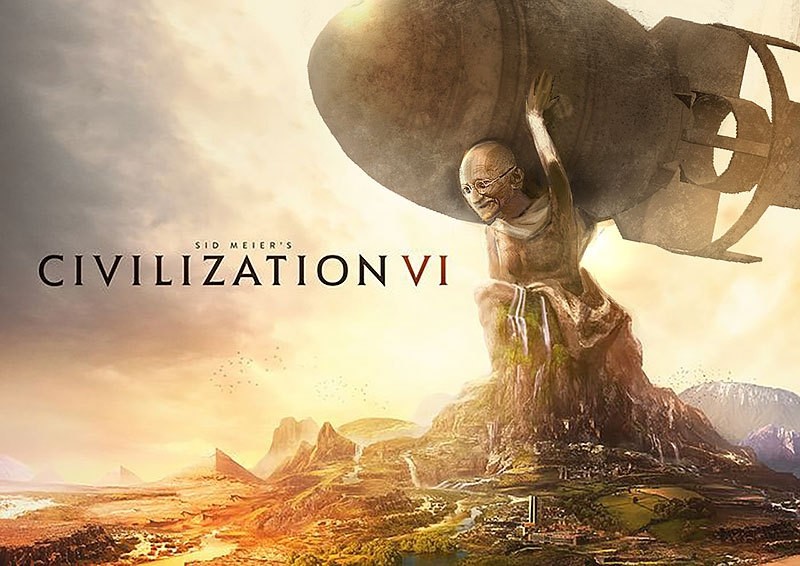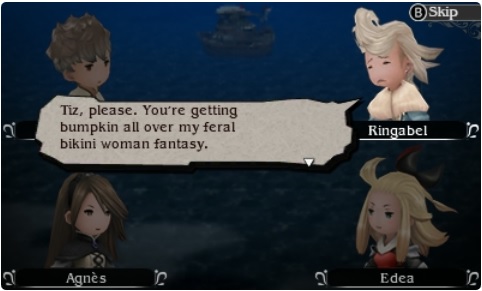This might sound blasphemous, but the women in Mafia III and Luke Cage fascinate me most. These women are simultaneously complex and maddeningly shallow. I say this to mean there is centuries of tears, laughter, abuse, and love tied up in each and every one of them, but at the same time all of this history and all of these emotions all seem to (by design) fall in service to the narratives’ main male protagonists. This seems especially odd when it is through the women in Mafia III that we learn much about the cultural and racialized history of the American South, that we get much of the background for the struggle that 2K Games is struggling to so accurately portray.
Through the women of New Bordeaux, who are being forced to sell their bodies, we get a glimpse into the history of women of the African Diaspora as bedwarmers, breeding stock, domestics, and so much more. And while it is their stories and their oppression that drives the action of the game in some very interesting ways these stories are never their own to tell because they are without Voice. We hear the tales of their sexual servitude in the crude and graphic tales told between confederate flag wearing racists, in “dirty’ things whispered by johns in alleys, and in the outspoken voices of Black men who are calling for change on the backs of the women who we see (metaphorically at least) always on their backs. The ambience in this game is powerful.
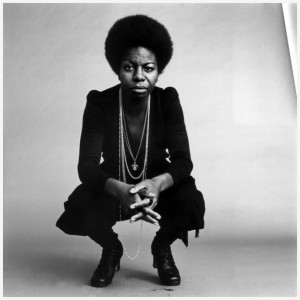
For this, my third post on Mafia III and Luke Cage, I am reminded constantly and almost violently of Nina Simone’s song Four Women, a song that calls to mind the myriad struggles of Black women of all ilks from the antebellum period forward. In what follows I will look at how the tropes of Simone’s four women map on to female characters (and groups of characters) in Mafia III and Luke Cage. As I write this post I must also disclose that I have not yet finished the main campaign of the game because I find myself constantly exploring new areas and new experiences and just doing things like driving around and listening to radio personalities and callers talk about the racial, political, and social conditions in New Bordeaux. These are rich experiences that I don’t want to let go of. These, and the music, but that could be a post in and of itself.
My skin is black
My arms are long
My hair is woolly
My back is strong
Strong enough to take the pain
inflicted again and again
What do they call me
My name is AUNT SARAH
My name is Aunt Sarah
– Four Women, Nina Simone (1966)
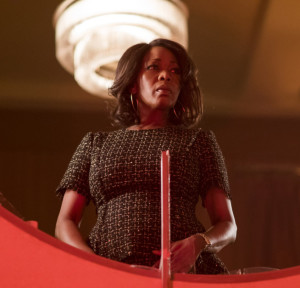 Mariah, oh sweet Black Mariah (“Don’t call me that!”), a woman who is as strong as she is damaged. A woman who is dark of skin (and reflective of the colorism that comes along with it) and fierce of spirit. We see in Mariah a woman who wants to create her Harlem. A Harlem that is restored to the undamaged state that she once knew (ironically a time when she herself was undamaged). We see from flashbacks that Mariah seems to so obsessed with the concept of personal strength now because as a child she was not “strong enough” to defend herself from sexual assault at the hands of Uncle Pete. Uncle Pete who accuses her in his last moments of “wanting it”. Uncle Pete who haunts her even in the moments that lead to her becoming Harlem’s new crime boss as she cries out that she “never wanted it” to Pete’s ghost or to what has come to be representative of what he stood for. Mariah is strong, she comes to protect herself even when no else would. (Her own mother chose to send her away rather than cut business ties with Uncle Pete.) She is strong in that as a child herself she becomes a surrogate mother/aunt to her cousin Cornell who has been abandoned at her mother’s door. Her name is Mariah.
Mariah, oh sweet Black Mariah (“Don’t call me that!”), a woman who is as strong as she is damaged. A woman who is dark of skin (and reflective of the colorism that comes along with it) and fierce of spirit. We see in Mariah a woman who wants to create her Harlem. A Harlem that is restored to the undamaged state that she once knew (ironically a time when she herself was undamaged). We see from flashbacks that Mariah seems to so obsessed with the concept of personal strength now because as a child she was not “strong enough” to defend herself from sexual assault at the hands of Uncle Pete. Uncle Pete who accuses her in his last moments of “wanting it”. Uncle Pete who haunts her even in the moments that lead to her becoming Harlem’s new crime boss as she cries out that she “never wanted it” to Pete’s ghost or to what has come to be representative of what he stood for. Mariah is strong, she comes to protect herself even when no else would. (Her own mother chose to send her away rather than cut business ties with Uncle Pete.) She is strong in that as a child herself she becomes a surrogate mother/aunt to her cousin Cornell who has been abandoned at her mother’s door. Her name is Mariah.
My skin is yellow
My hair is long
Between two worlds
I do belong
My father was rich and white
He forced my mother late one night
What do they call me
My name is SAFFRONIA
My name is Saffronia
Saffronia, the tragic mulatto. Because of the strength of the women who we see characterized in these media, we do not see many women who are tragic in their helplessness, women who do not know their true selves. What we do get is the image of a woman who seems to be torn between two worlds. Torn between a world that allows her to love a convict and one that requires her to be his captor. It is in Reva Connors, the wife of Luke Cage that we see this tragic woman. One pulled between the Blackness of the community that raised her and the Whiteness of the penal system that exists to enslave and experiment on those like her (if only she realized that likeness). The depth of this tragedy only becomes apparent after her death.
My skin is tan
My hair is fine
My hips invite you
my mouth like wine
Whose little girl am I?
Anyone who has money to buy
What do they call me
My name is SWEET THING
My name is Sweet Thing
Sweet things. Beautiful women of the bayou who do not belong to themselves. They belong to the Dixie Mafia. The best of the bunch, are kept placated with heroine, as the thoroughbred prostitutes in Merle Jackson of the Dixie Mafia’s “stable”. An operation that is being run, to add insult to injury, out of the club that belonged to Lincoln Clay’s now dead father, Sammy, and was named after Sammy’s deceased wife, Perla. These women are held captive in Perla’s, which now features Confederate flags on the walls, and are there to serve the racist and sexual fantasies of their all white clientele. It is here in Perla’s that we see reminiscences of slave women who were sent down to Louisiana for the purposes of being sold at mulatto and octoroon balls. Balls were women were sold specifically into sexual servitude. Where white men with means could indulge in their fantasies of having sex with women of color. It is this practice of sexual servitude that we hear even in the faceless voices of Black men on the radio as Lincoln Clay drives around on his mission to free the women. We also hear this history in the “locker room talk” between the white men, about what they’d done to these women and what they planned to do in the future, that gets overheard by Lincoln as his stealthily moves in on them. But what’s ever apparent (and important) is that Lincoln Clay is killing these men not for the sake of freeing the women, but rather because breaking up the prostitution ring will ruin the business of the Sal Marcano (through his underbosses) who has murdered his family. Clay is not a willing hero, these women are a means to an end for him and nothing more. They are still commodities, their collective name is Sweet Thing.
My skin is brown
my manner is tough
I’ll kill the first mother I see
my life has been too rough
I’m awfully bitter these days
because my parents were slaves
What do they call me
My name is PEACHES
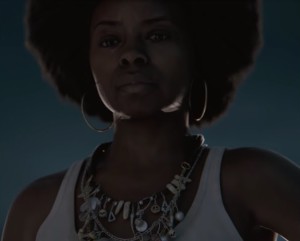 Cassandra is the revolutionary of my youth. She is Foxy Brown and Coffy rolled into one. She is a woman who seems to have a conscience and who is willing to do something about it. She begins with trying to take over Sammy’s business at the beginning of the game partially because she doesn’t see him as being socially responsible enough. He is living too high on the hog while the rest of the Black folks in the Hollow are going hungry and waiting for Sammy to throw them a bone when he determines that the time is right (like in celebration of the return on his son, Lincoln, from the war). Cassandra is willing to do what she must to keep the Black people of the Hollow safe. She chastises Lincoln for not being forward thinking enough to realize that the war that he has started will extend past himself. She questions him on what he thinks will happen to the rest of them when he is not around if he does not help get them the weapons that they are going to need to protect themselves. Cassandra’s critique shows the player how deeply flawed Lincoln is as a character because once again he is willing to allow Cassandra’s crew to put their lives in jeopardy to take over Marcano family businesses, but will not sufficiently outfit them past that because he is not interested in starting a “revolution”. But it’s this revolution that Cassandra had been seeking from the very beginning. One being waged not only against Sammy’s rule over the Hollow, but also against the white men of the Dixie Mafia (and those who supported them) who were taken with kidnapping Black folks, hunting them like escaped slaves for sport, and murdering them in most vicious ways. Cassandra’s war is one that is being waged against racism, classism, and colorism in the community. Her Haitian heritage makes her more fearsome because of the irrational fear that the white people in the game seem to have have of VooDoo considering the fact that the game takes place in a region where the practice and the belief are practically the norm. Her political and social objectives seem to be diametrically opposed to those of Lincoln’s and so we realize even from the moment that he seeks out her help in his cause that things will not end well, her character feels like it only wants to act in service to Lincoln’s for as long as it has to in order to secure her next big vantage point (but time and several more hours of gameplay will tell).
Cassandra is the revolutionary of my youth. She is Foxy Brown and Coffy rolled into one. She is a woman who seems to have a conscience and who is willing to do something about it. She begins with trying to take over Sammy’s business at the beginning of the game partially because she doesn’t see him as being socially responsible enough. He is living too high on the hog while the rest of the Black folks in the Hollow are going hungry and waiting for Sammy to throw them a bone when he determines that the time is right (like in celebration of the return on his son, Lincoln, from the war). Cassandra is willing to do what she must to keep the Black people of the Hollow safe. She chastises Lincoln for not being forward thinking enough to realize that the war that he has started will extend past himself. She questions him on what he thinks will happen to the rest of them when he is not around if he does not help get them the weapons that they are going to need to protect themselves. Cassandra’s critique shows the player how deeply flawed Lincoln is as a character because once again he is willing to allow Cassandra’s crew to put their lives in jeopardy to take over Marcano family businesses, but will not sufficiently outfit them past that because he is not interested in starting a “revolution”. But it’s this revolution that Cassandra had been seeking from the very beginning. One being waged not only against Sammy’s rule over the Hollow, but also against the white men of the Dixie Mafia (and those who supported them) who were taken with kidnapping Black folks, hunting them like escaped slaves for sport, and murdering them in most vicious ways. Cassandra’s war is one that is being waged against racism, classism, and colorism in the community. Her Haitian heritage makes her more fearsome because of the irrational fear that the white people in the game seem to have have of VooDoo considering the fact that the game takes place in a region where the practice and the belief are practically the norm. Her political and social objectives seem to be diametrically opposed to those of Lincoln’s and so we realize even from the moment that he seeks out her help in his cause that things will not end well, her character feels like it only wants to act in service to Lincoln’s for as long as it has to in order to secure her next big vantage point (but time and several more hours of gameplay will tell).
Overall, the mental and narrative strength of the women in Mafia III and Luke Cage seems to be such that without their presence the story would fall apart. Ironically, I don’t know if the same could be said of the male characters in the media. Of course they would not be the same stories, but they could be equally fascinating.

